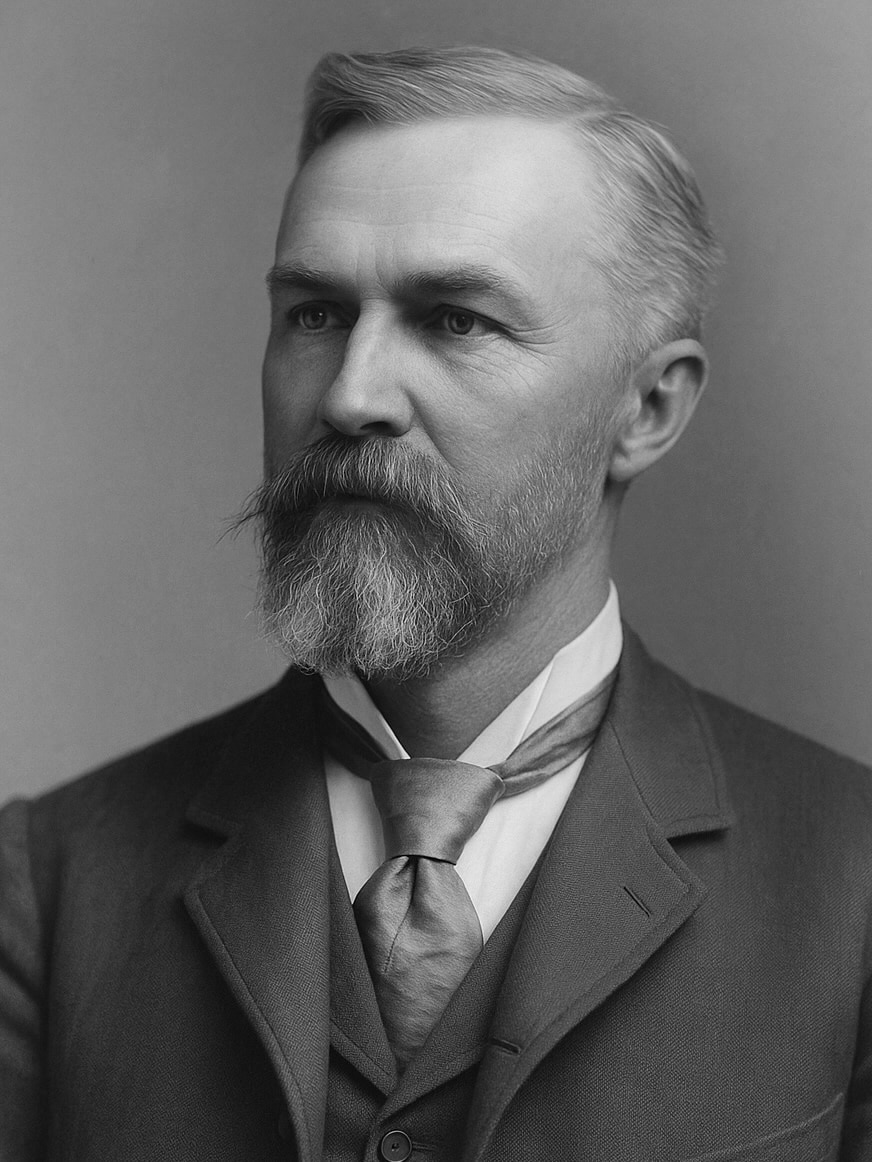George Huntington

George Huntington (1850-1916) was an American physician
Described Huntington’s disease at the age of 22 in his first two publications
Biography
- Born April 9, 1850 in East Hampton, to physician father George Lee Huntington (1811–1881) and grandfather Abel Huntington (1778–1858)
- 1871 – medical license from University of Columbia, New York
- 1874 – moved to New York and practiced medicine in Duchess County until retirement in 1915
- Died March 3, 1916
Medical Eponyms
Huntington’s disease (1872)
On February 15, 1872 George Huntington gave his classic presentation On Chorea at the Meigs and Mason Academy of Medicine, Middleport, Ohio. Following a positive reception he submitted the manuscript to the Medical and Surgical Reporter of Philadelphia, where it appeared on April 13, 1872
Hereditory nature
When either or both the parents have shown manifestations of the disease, one or more of the offspring invariably suffer from the condition. It never skips a generation to again manifest itself in another. Once having yielded its claims, it never regains them
Huntington in his description states that the first symptoms usually occur at an adult age, and he delineates the development of the chorea and the mental manifestations
The movements gradually increase when muscles hitherto unaffected take on the spasmodic action, until every muscle in the body becomes affected (excepting the involuntary ones)…
As the disease progresses the mind becomes more or less impaired, in many accounting to insanity, while in others mind and body gradually fail until death relieves them of their suffering
Over 50 years ago, in riding with my father on his rounds I saw my first case of “that disorder”, which was the way the natives always referred to the dreaded disease. I recall it as vividly as though it had occurred but yeasterday. It made a most enduring impression upon my boyish mind, an impression which was the very first impulse to my choosing chorea as my virgin contribution to medical lore. Driving with my father through a wooded road leading from East Hampton to Amagansett, we suddenly came upon two women both bowing, twisting, grimacing. I stared in wonderment, almost in fear. What could it mean? My father paused to speak with them and we passed on. Then my Gamaliel-like instruction began; my medical instruction had its inception. From this point on my interest in the disease has never wholly ceased.
Huntington 1909 [Lecture to the New York Neurological Society]
In the history of medicine there are few instances in which a disease has been more accurately, more graphically, or more briefly described than that in which Dr. Huntington calls attention to an Hereditary Chorea which prevailed at the eastern end of Long Island, where both his father and grandfather had practised.
Major Publications
- Huntington G. On Chorea. Medical and Surgical Reporter of Philadelphia. 1872; 26(15): 317–321.
- Huntington G. Does chloroform ever cause diabetes? A question to the medical profession. Medical Record 1880; 18: 51-52.
- Huntington G. Huntington’s chorea. Brooklyn Med J 1895; 9: 173-174.
- Huntington G. Chronic progressive or Huntington’s chorea. Transactions of the Tri-State Medical Association. 1903; 5: 180-185.
- Huntington G. Recollections of Huntington’s chorea as I saw it at East Hampton, Long Island, during my boyhood. Journal of Nervous and Mental Disease. 1910; 37: 255-257.
References
Biography
- Stevenson CS. A biography of George Huntington, M.D. Bulletin of the Institute of the History of Medicine. 1934; 2(2): 53-76.
- van der Weiden RM. George Huntington and George Sumner Huntington. A tale of two doctors. Hist Philos Life Sci. 1989;11(2):297-304
- Durbach N, Hayden MR. George Huntington: the man behind the eponym. J Med Genet. 1993 May;30(5):406-9.
- Bhattacharyya KB. The story of George Huntington and his disease. Ann Indian Acad Neurol. 2016 Jan-Mar;19(1):25-8.
- Owecki MK, Magowska A. George Huntington (1850-1916). J Neurol. 2019 Mar;266(3):793-795.
- Beighton P, Beighton G. George S Huntington In: The Man Behind the Syndrome. Springer 1986 80-81
Eponymous terms
- Lund JC. Chorea Sti Viti i Sætersdalen. Uddrag af Distriktslæge J. C. Lunds Medicinalberetning for 1860. Beretning om Sundhedstilstanden m.m. i Norge i 1860: 137-138.
- Browning W. Huntington number. In: Neurographs: a series of neurological studies, cases, and notes. 1908
- Lanska DJ. George Huntington (1850-1916) and hereditary chorea. J Hist Neurosci. 2000 Apr;9(1):76-89.
Eponym
the person behind the name
BA MA (Oxon) MBChB (Edin) FACEM FFSEM. Emergency physician, Sir Charles Gairdner Hospital. Passion for rugby; medical history; medical education; and asynchronous learning #FOAMed evangelist. Co-founder and CTO of Life in the Fast lane | On Call: Principles and Protocol 4e| Eponyms | Books |
